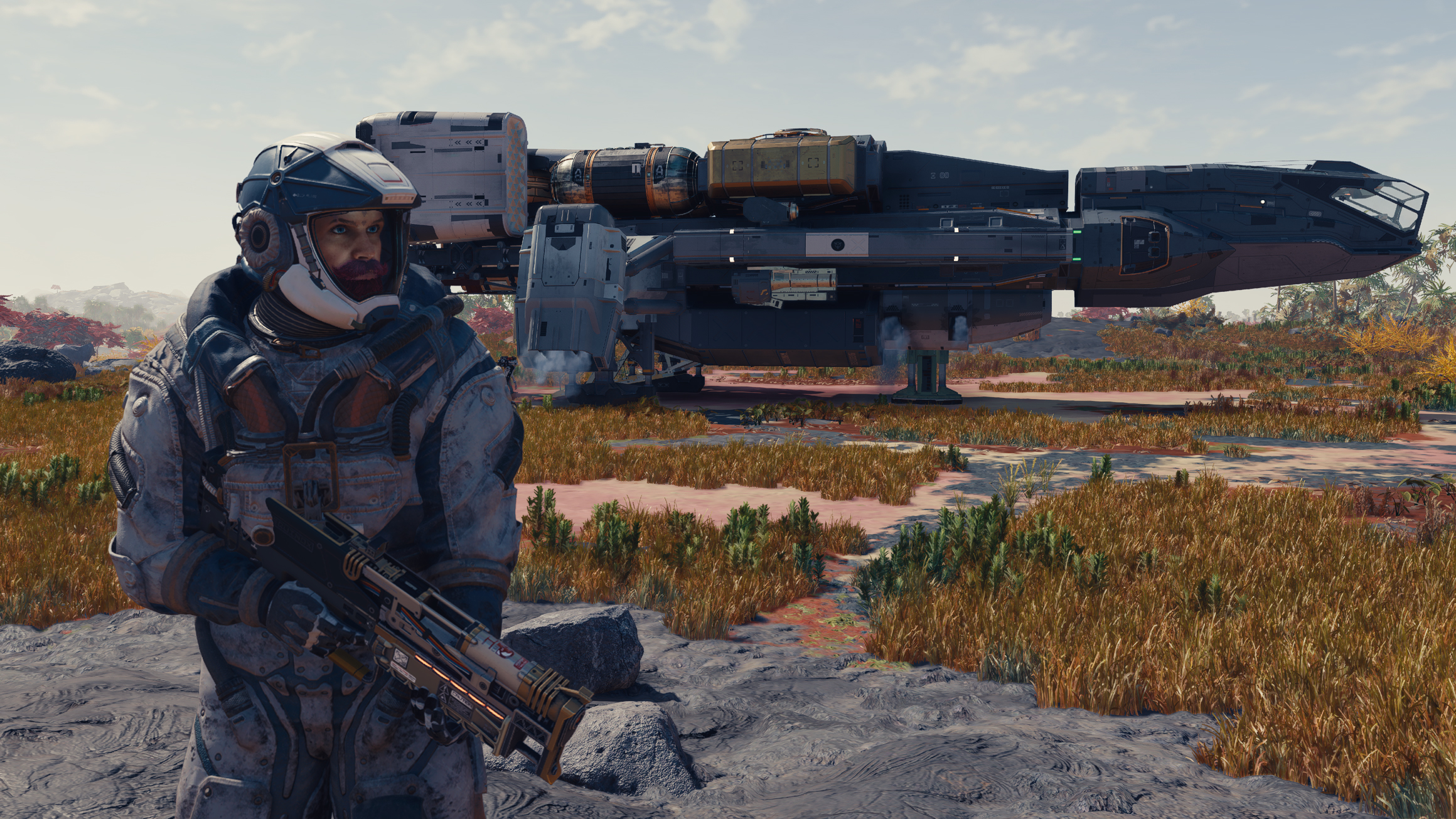Our Verdict
Starfield shares plenty of DNA with Skyrim and Fallout 4, but ultimately falls short of both.
PC Gamer's got your back
Here are a few memorable things I've done across the Milky Way over the past two weeks:
- Scanned 250 planets, walked on over 100 of them, went swimming on one of them, died of hypothermia almost instantly.
- Docked with 25 space stations and blew up more than 50 ships (stole a few, too)
- Smuggled human organs and illegal religious texts.
- Got immediately arrested for smuggling human organs and illegal religious texts.
- Listened to my father tell me he was proud of me, right before he handed me a gun.
- Worked for a crime boss, pickpocketed his door key, and did crimes all over his house
- Got married to my soulmate while a giant space slug randomly slithered over to me and made disgusting slurping noises at my feet. (That's the risk of outdoor weddings on muddy alien planets, I guess.)
What is it? Bethesda's long-awaited, huge honkin' space RPG
Expect to pay: $70/£60
Developer: Bethesda Game Studios
Publisher: Bethesda Softworks
Reviewed on: Intel i7-9700K, RTX 4070 Ti, 16GB RAM
Multiplayer? Heck no.
Link: Official site
The more I've played Starfield, the more I've liked it, and for the same reasons I enjoy Bethesda's other RPG sandboxes. The fun collision between structured quests and unpredictable systems creates moments that feel more personal and memorable than those of many other games.
It took me a while to find that fun, though. Starfield's introduction is unusually straightforward for a Bethesda RPG, and the first handful of places you visit, including the game's capital city of New Atlantis, are pretty dull. It took about a dozen hours before I started really enjoying it, but after rolling credits on the main quest with one character and ignoring that quest to become an aspiring drug kingpin with another, I can finally say that, in the end, I like Starfield.
But I don't love Starfield. And that's genuinely disappointing because with the exception of Fallout 76, I've loved each of Bethesda's RPGs since 2006's Oblivion. I've spent hundreds of hours in those games and still invent new excuses just to spend more time in their worlds, like roleplaying an NPC in Skyrim for weeks and seeing how long I could play Fallout 4 without leaving the starting settlement of Sanctuary.
Starfield is Bethesda's biggest RPG ever, and it shares even more DNA with Skyrim and Fallout 4 than I expected—but it ultimately falls far short of the greatness of both of those games. The main companions lack personality, quests that have promising starts frequently come to disappointing conclusions, and space exploration fails to feel like a grand adventure. I liked a lot of what I experienced in Starfield, and it's as huge as promised, but it's not the epic space adventure I was hoping for.
Slow liftoff
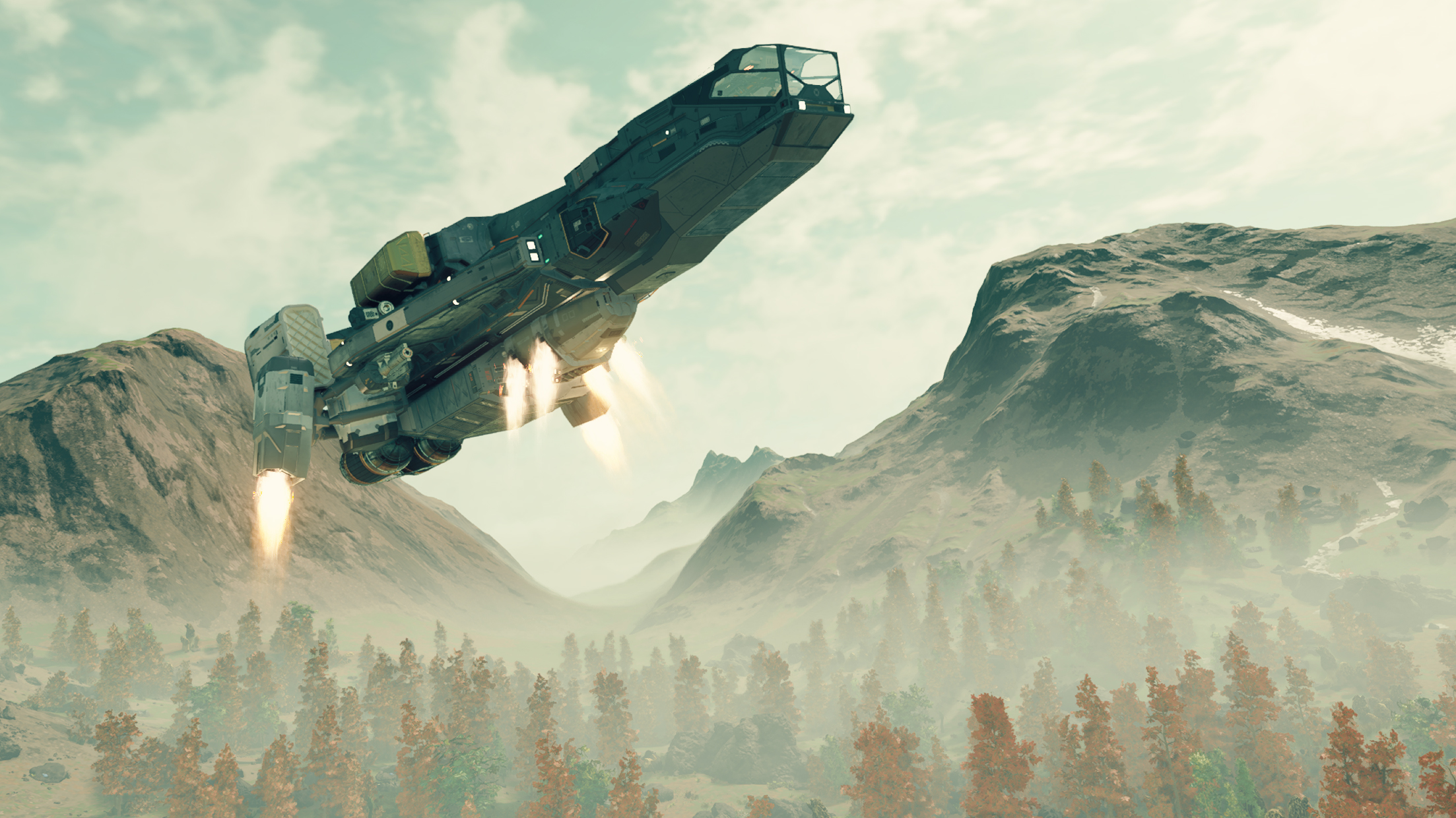
Bethesda RPGs have a history of awesome opening sequences: the assassination plot and escape through the sewers in Oblivion, living through your entire childhood in Fallout 3, and of course the iconic wagon trip to your execution in Skyrim. So it's almost startling how straightforward Starfield's opener is.
My space-folks eventually became one of my favorite parts of Starfield.
It's the year 2330 and humankind has colonized the galaxy, and you're a miner on a distant planet who finds a mysterious artifact during your first day on the job. Then things happen quickly: you shoot some pirates, learn to fly a spaceship, and meet a few explorers who are part of a group called Constellation, looking to find more artifacts like yours. I kept waiting for some "wow" moment that would make the tutorial feel less like a tutorial, but the only surprising thing about my introduction to Starfield was that it didn't contain any surprises.
The next handful of hours were similarly underwhelming. I carefully explored the blandly futuristic city of New Atlantis, its generic sci-fi skyscrapers looking like something you'd see in the background in a Star Trek movie. I took off and landed on the randomly generated terrain of a few planets, walked around peering at alien critters and mineral formations and randomly placed research labs filled with angry space raiders, then flew back to the city feeling unimpressed by what I'd found.
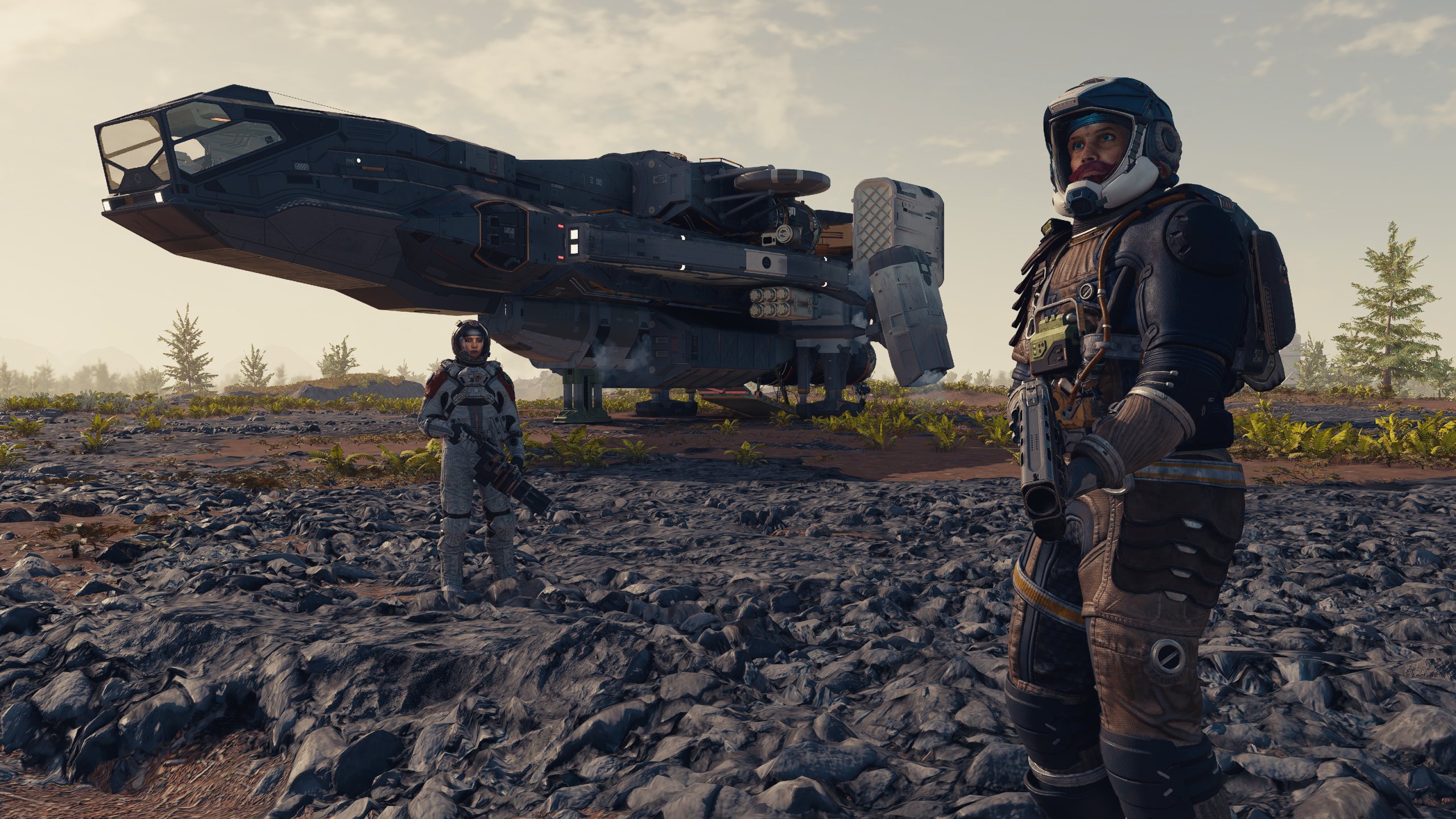
The first few companions of Constellation I met were disappointing, too: a pleasant man, a pleasant woman, and another pleasant man. They were all extremely nice and agreeable, but that's not really what I'm looking for in a follower. Where were the weirdos Bethesda is so good at creating? Where were Starfield's versions of Nick Valentine, or Cicero, or Curie? Even Vasco the robot is kind of a bore—wait, didn't Bethesda used to be great at making entertaining robots?
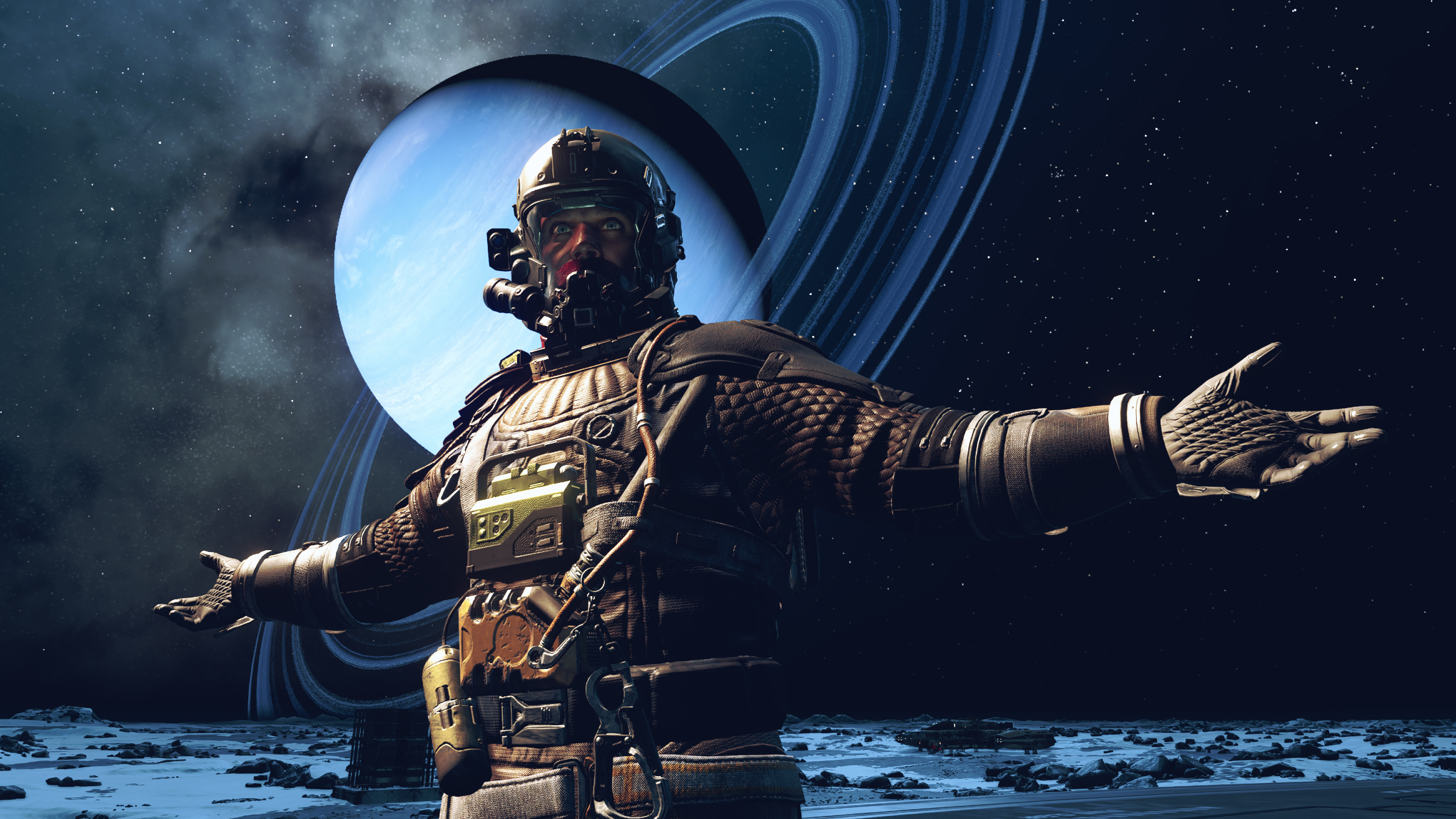
Starfield guide: Our hub of advice
Starfield console commands: Every cheat you need
Starfield mods: Space is your sandbox
Starfield traits: The full list, with our top picks
Starfield companions: All your recruitable crew
Starfield romance options: Space dating
Thankfully, once I'd left those early hours behind I finally began to see flashes of brilliance. First it was via the traits I'd chosen during character creation. One trait gave me parents, a retired middle-aged mom and dad, with the downside that I had to support them with a weekly cash allowance. At first my folks were simply sweet and supportive—impressed with my new job at Constellation, telling me they'd heard about some of my exploits on the news—but later they began popping up unexpectedly and hilariously in places you wouldn't expect to see your aging parents.
My space-folks eventually became one of my favorite parts of Starfield as they had their own little adventure in the background of my bigger one, and their cameos around the galaxy were never pinpointed with a quest marker—particularly refreshing for a Bethesda game. Plus, it's funny that they're cruising around the stars on my dime. Just that single trait (and you can pick up to three in character creation) added more to my character's experience than any of Cyberpunk 2077's disappointing "lifepaths" did.
I was also relieved to finally meet an interesting Constellation companion, Andreja. She still wasn't on par with earlier Bethesda RPG followers and the romance didn't exactly give me butterflies, but her complicated, slowly revealed past and an excellent performance by actor Cissy Jones made me fond of her just the same. Most importantly, traveling with Andreja buffed my stealth and pickpocketing skills, and when I shoved a bunch of extra weapons into her inventory because they were too heavy for me to carry, she selected a massive gatling gun to wield as her primary. Now that's romantic as hell.
Faction action
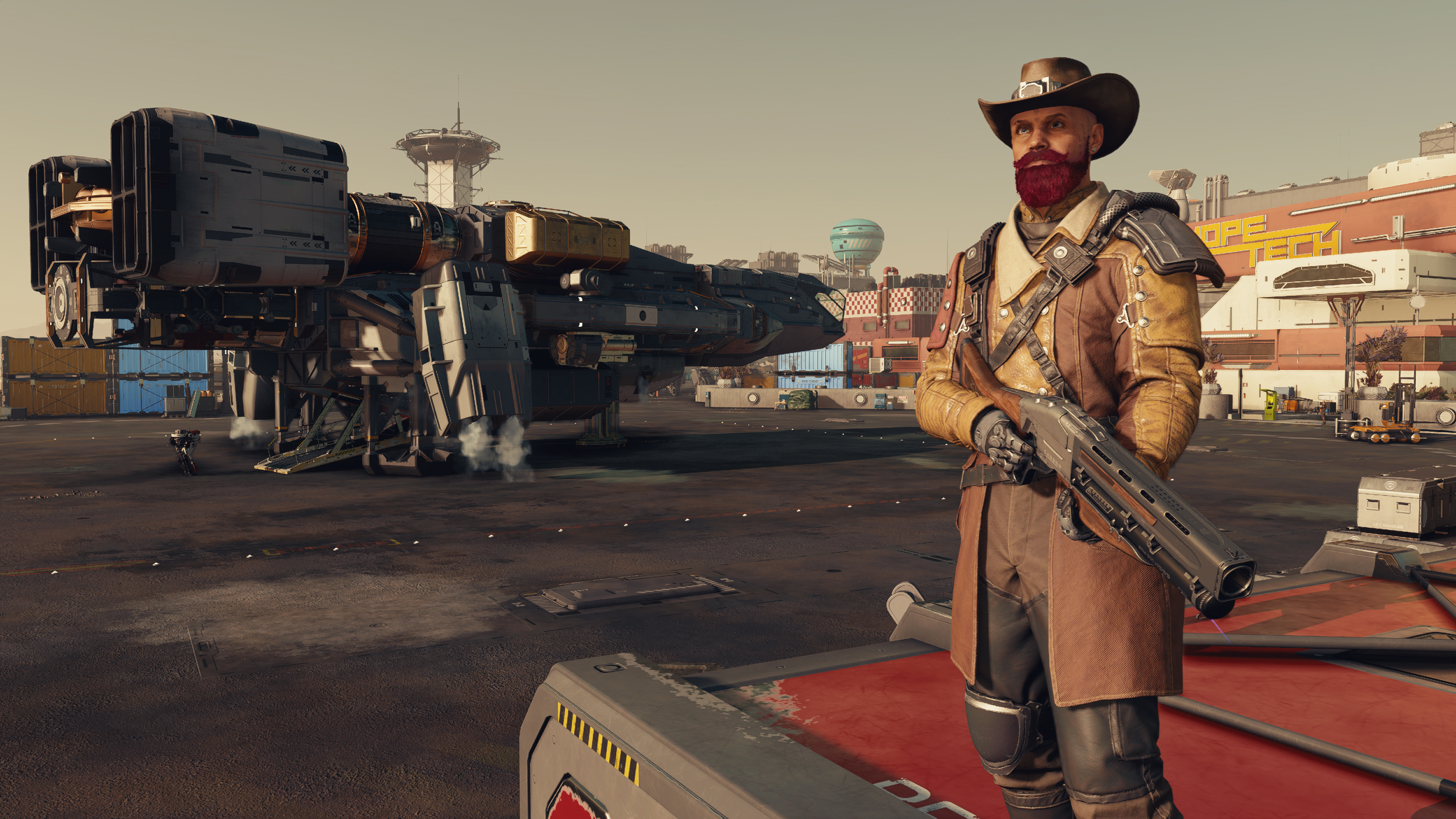
While New Atlantis didn't impress me, there are better settlements out there. Akila City is a rustic Wild West town on an untamed planet—with muddy streets and busy saloons it's a bit like the town of Valentine from Red Dead Redemption 2 got launched into space. A crusty old marshal in a leather duster enlisted me to deal with a bank robbery the moment I moseyed into town—who better to help him negotiate a tense hostage situation with heavily armed outlaws than a complete stranger?
Plenty of shootouts, a couple of fugitive hunts, and a big bad guy who needed to be toppled, just like in any good Western.
After I solved his problem by failing to negotiate and succeeding to shoot everyone, I quickly signed up to be a space ranger in the Freestar Collective—they're basically space cops but at least I got to wear a cool hat. And that kicked off a series of faction quests beginning with a classic western premise: a humble farmer being run off their land by hired thugs. It was a long and enjoyable series of connected quests leading through some cool sci-fi environments like a huge mech graveyard and a mining operation inside a crystal-filled asteroid. There were plenty of shootouts, a couple of fugitive hunts, and a big bad guy who needed to be toppled, just like in any good Western. It also introduced some lore to a universe that so far had felt severely lacking in it, as anger and bitterness over a war long past came bubbling to the surface.
While I was enjoying being a space cowboy, I was also enduring the main story quests, which mostly involve the gathering of more artifacts. Those missions could sometimes be interesting, such as when one artifact had already been found by an eccentric collector who had turned his massive starship into a museum of oddities and wasn't willing to part with his favorite exhibit. The main quest also eventually introduced a recurring enemy who I slowly realized functions like Skyrim's dragons—a high-level menace who randomly turns up when you're trying to get other things done, leading to a fight that's pretty much always the same. It may not be a dragon this time, but it's definitely a drag.
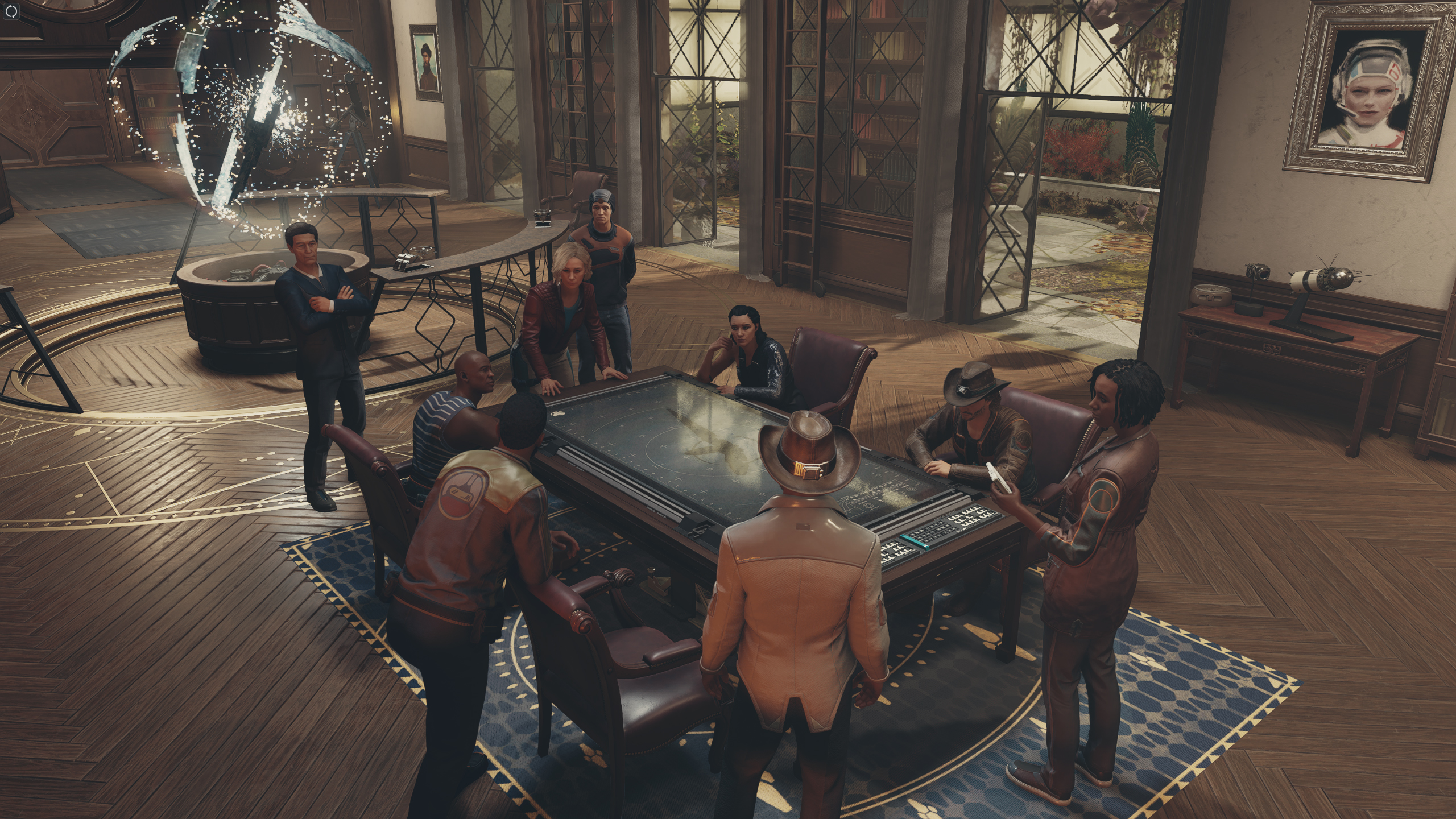
More disappointing is a surprisingly repetitive collection of main quests to visit a series of ancient temples, missions that are so similar in format it feels like Bethesda just copy-pasted them onto different planets. There's almost nothing to them: land on a planet, run for a few minutes in a straight line to reach the temple, then go inside and do the same thing you did in the last one. The rewards are different and occasionally quite good (yes, I'm being deliberately vague), but these temple quests are interesting exactly once, the very first time, and then become the definition of a mindless chore.
Movement in Starfield is majorly improved over earlier Bethesda games.
At least the story of the main quest is a creative one. When I first learned Starfield was about finding mysterious ancient artifacts buried deep inside planets, I figured I knew how it would end up, and I'm happy to say I was completely wrong (and even happier to say that pretty much everyone posting story theories on Reddit is also completely wrong). The story of Starfield's main quest genuinely surprised me on more than one occasion (to be precise: two occasions) and being surprised is never a bad thing. The conclusion of the main quest also gives rise, quite brilliantly, to Starfield's New Game+, allowing you to retain your character and skills while starting over from the beginning in a way that makes perfect sense within the game's logic.
Packing heat
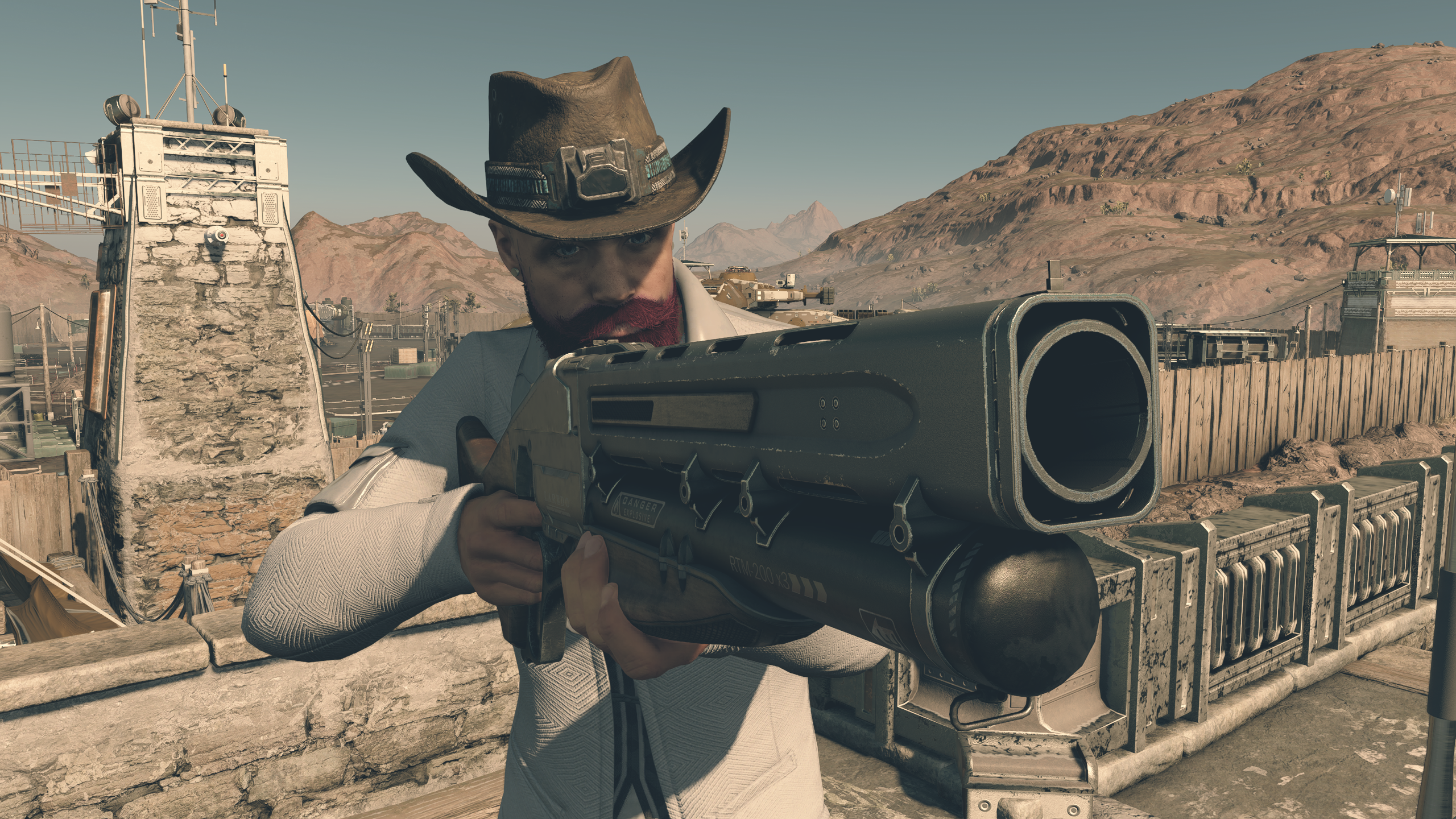
I talked my way out of a lot of jams in Starfield—I even managed to peacefully settle the very last face-off of the main story quest—but it's also got the longest, biggest battles I can remember in a Bethesda RPG. Luckily, the shooting felt just as good as it did in Fallout 4 (minus VATS) and I came across so many guns I liked that I had trouble fitting them all in my radial menu. Early on I found a pistol that ignores armor completely, making it feel like a cheat code that ends fights early (especially once I ranked up my pistol skill a few times) and a rifle that does more damage with each successful hit, forming the best incentive for never missing a shot.
I have a bullpup that occasionally does radioactive damage, a sniper rifle that does double damage against a target with full health, and a laser pistol I'd love to see the patent for because it somehow causes its victims to drop more health kits than they normally would. I dabbled a bit with weapon modding, which is quite similar to Fallout 4's tinkering system, but it hardly seemed worth it due to the number and variety of guns I found already randomly outfitted with mods and attachments.
Despite cruising from one end of the galaxy to the other in Starfield, I never really felt like I was going anywhere.
Complementing my arsenal is my boostpack, which lets me launch into the air during combat, and the lower the gravity on the planet I'm on, the higher and faster I can boost. Ambushed by serpent-worshiping fanatics or enormous angry space roaches? No problem. Just launch 20 feet straight up into the air and fire down at the top of their heads. (Enemies and companions can boost, too, but only a little here and there. You're basically the Dragonborn of jetpacks.)
In general, movement in Starfield is majorly improved over earlier Bethesda games, especially since your character will grab ledges, corners, tree branches, and nearly anything else you collide with so you can mantle yourself up and over catwalks, rooftops, spaceships, or most anything in your way. Someone ought to mod Starfield's movement system into Skyrim: you could clamber up to High Hrothgar in under a minute.
Too big to fill
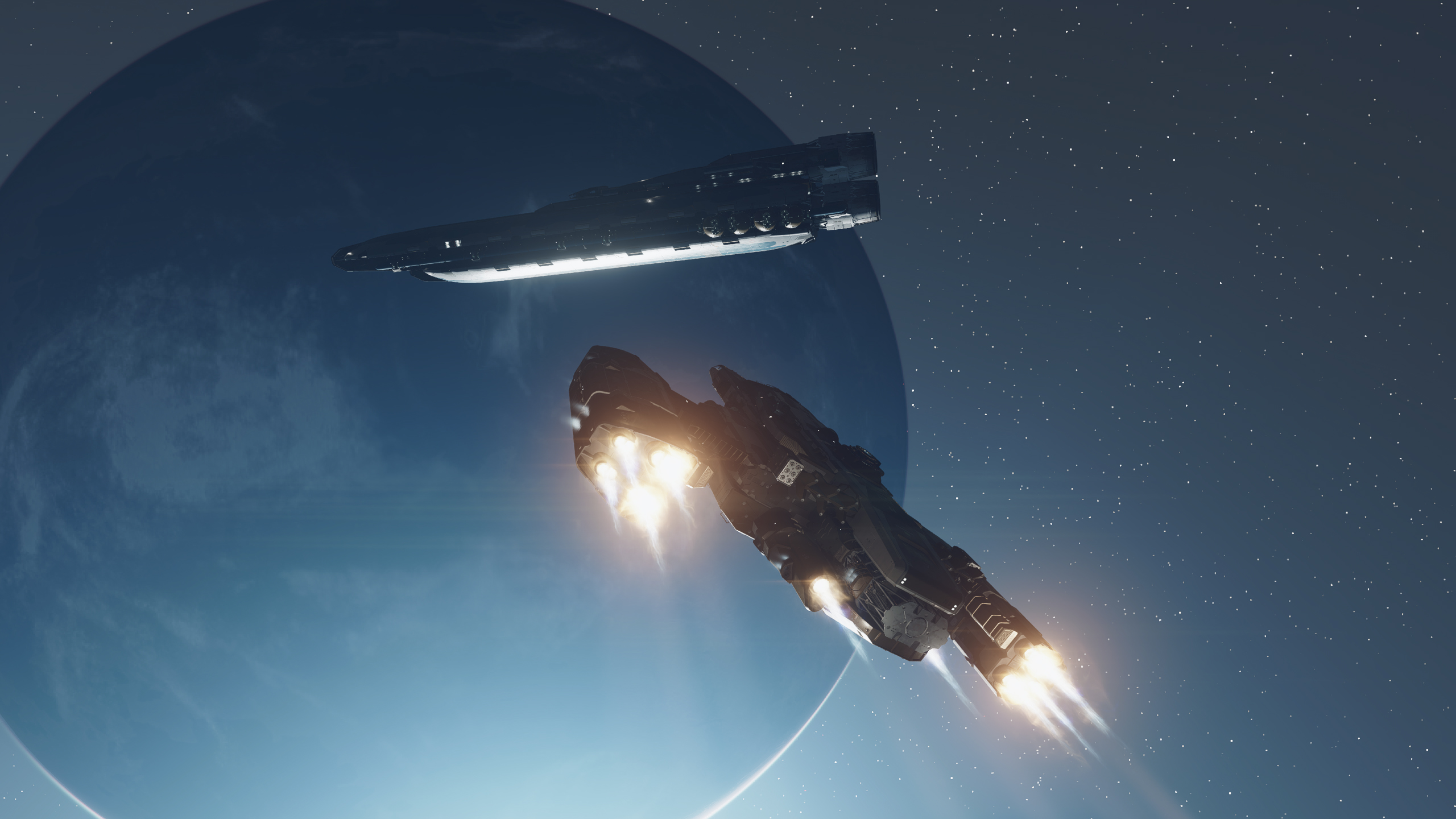
Sapping a bit of my enthusiasm for being a helpful star-hopping cowboy was the star-hopping itself. I never expected Starfield to be the sort of fully open-ended spaceship sim Elite Dangerous is, or for it to replicate the freedom of flight in No Man's Sky, but it's hard not to feel like there's something missing here. I never felt excitement or awe, no goosebumps as my engines fired, no sense of grandeur as I set down on a new world. That's because, despite cruising from one end of the galaxy to the other in Starfield, I never felt like I was really going anywhere.
Click a star on a galaxy map and it'll show you a solar system. Click a planet and it'll zoom in. Click the planet's moon to zoom in again, click the spot you'd like to land (anywhere but the ocean), then watch a cutscene of yourself landing. Space travel, docking, boarding, and getting onto and off your ship is a series of cutscenes, black screens, and loading screens.
Even though that's more or less what I was expecting, it still feels underwhelming. For anyone hoping for passenger or cargo missions, there are some but they're pretty unsatisfying since they can be completed with a few simple clicks. As the hours pass, travel starts to feel somehow both too fast (I clicked a location on the map and now I'm already standing on it?) and too slow (do I really have to watch the same docking cutscene every single time I visit a space station?).
Then there's all those planets and moons themselves. My incendiary take on Starfield's 1,000+ planets after years of anticipation? They're fine.
I don't know how else to describe it: exploring Starfield's planets is... fine. Many are dull, lifeless orbs, as you'd expect to find in a semi-realistic galaxy. Others are genuinely lovely and my first order of business was to drop a beacon so I could build a base there. Most star systems have at least one planet with abundant plant life and alien critters skittering, stomping, or flapping around, and even barren worlds have points of interest scattered across the segment of the planet you land in.
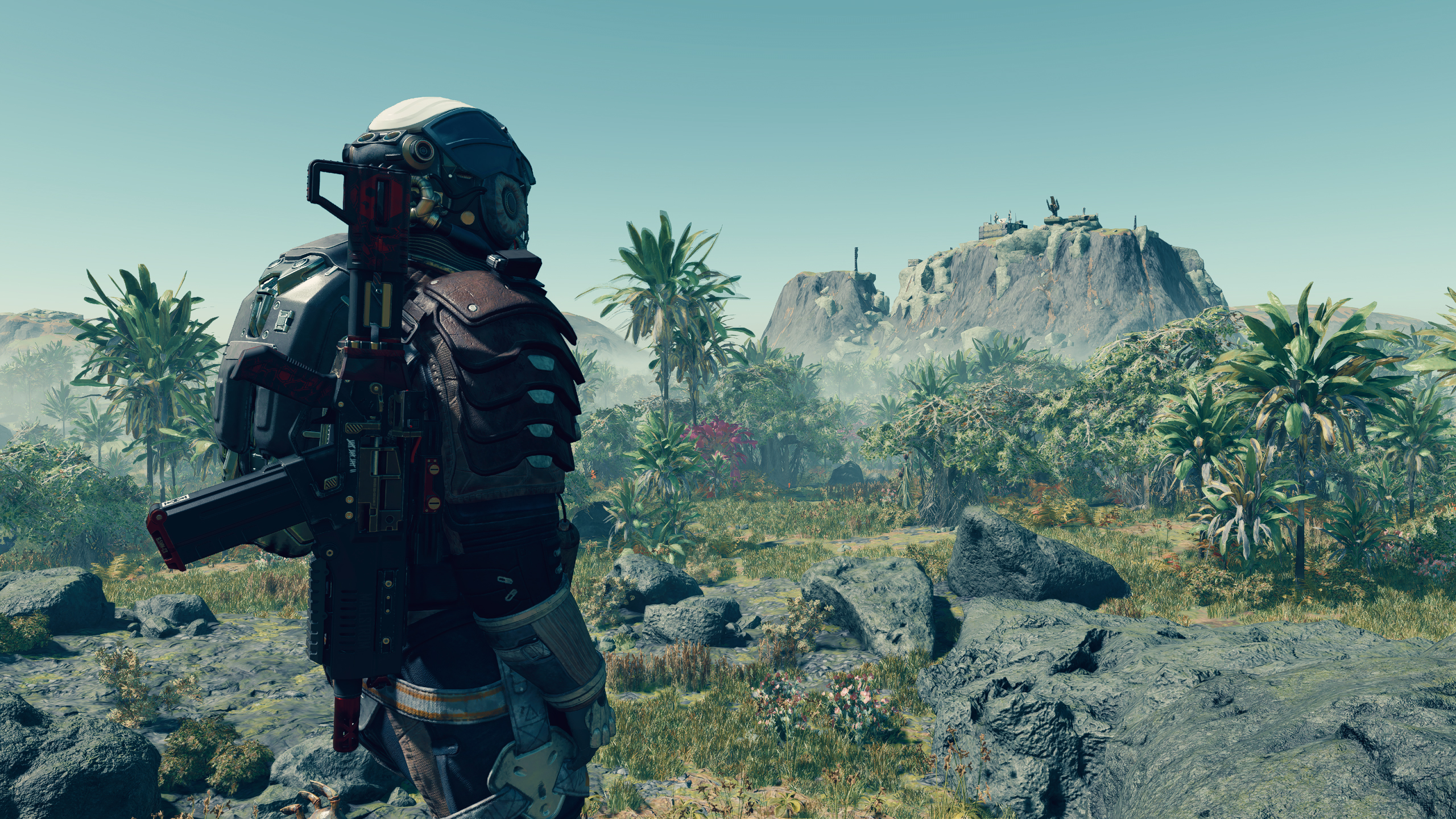
Some of those points can be vaguely interesting, like a huge fungal forest (and the bodies of some careless botanists who visited them without helmets on), the remnants of a stunningly large industrial outpost, a massive jagged upheaval of ice or a towering rock structure that just about makes it worthwhile to run for a thousand uneventful meters across the surface of the planet to take a photo of. Thing is, these sights are interesting the first time, but not so much the fifth time.
What's really missing in Starfield's planetary exploration is what happens in other Bethesda RPGs: You head out toward your destination and get completely distracted along the way: meeting an NPC, hearing a nearby dispute, stumbling onto a new quest, and never quite getting the place you intended to without finding in a half-dozen new things to add to your to-do list. You get some of that in Starfield's cities, and occasionally you'll pick up a signal or be hailed by another ship when entering the orbit of a planet, but not while exploring the surface of a planet itself.
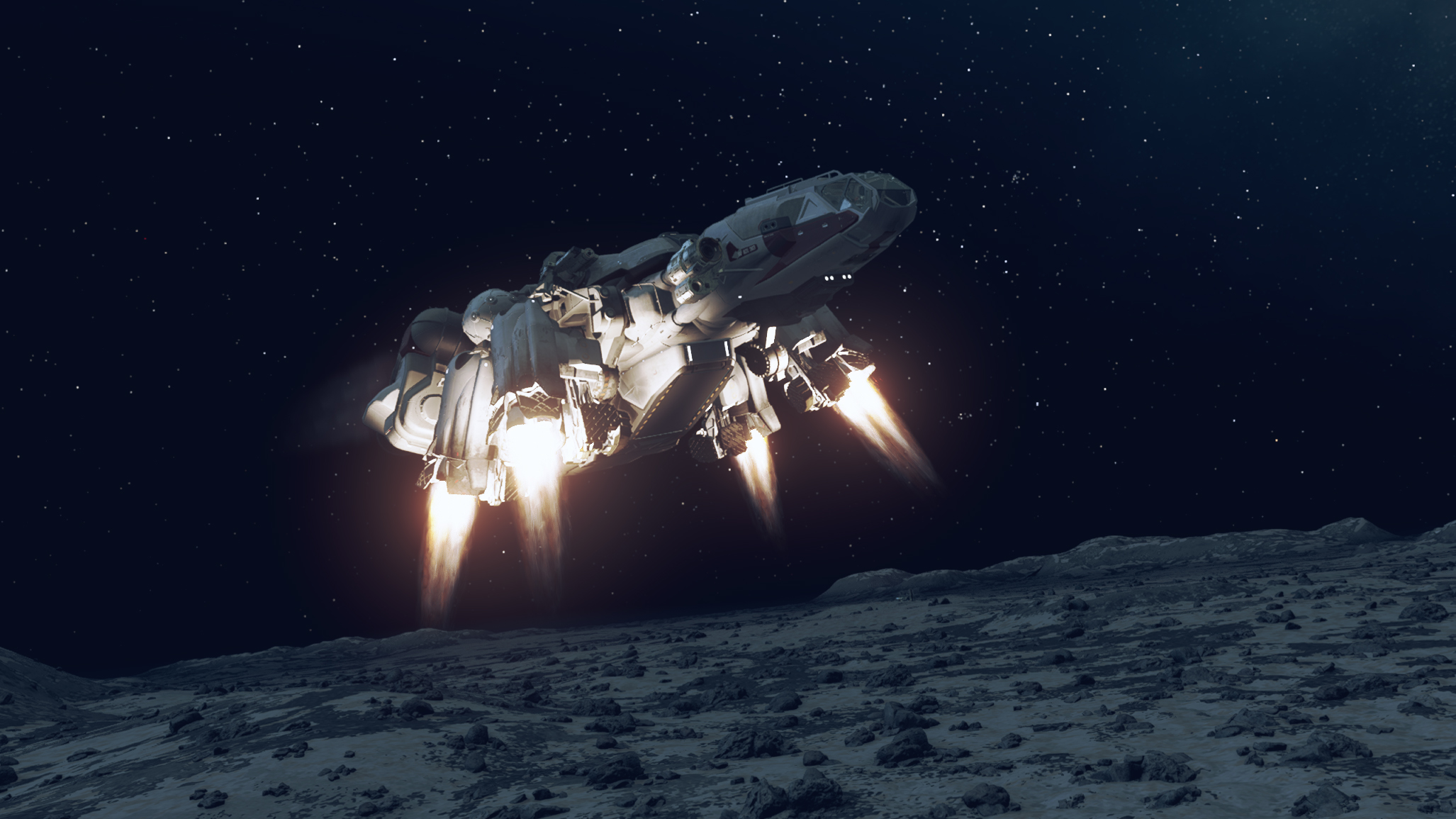
One saving grace to the act of cutscening across the galaxy is that Starfield's spaceships are cool, stylish inside and out, and often surprisingly huge. I only wish I had more reason to spend real time inside my ship. When crossing the galaxy just takes a few clicks of a mouse, it doesn't make sense to hang out in my ship's interior, with all its compartments and modules and ladders (yes, Bethesda finally got ladders working).
The only really good use of my ship—and one of the best parts of Starfield altogether—is disabling an enemy ship in orbit without destroying it completely, and then boarding it. Then you get to stalk through the enemy ship, compartment by compartment, level by level, engaging in close-quarters combat with scores of enemies and sometimes even automated defenses. It's a rush, with each ship feeling like a deadly, tightly-designed maze, with the bonus being that if you like the ship you've raided you can add it to your fleet.
Sandbox of stars
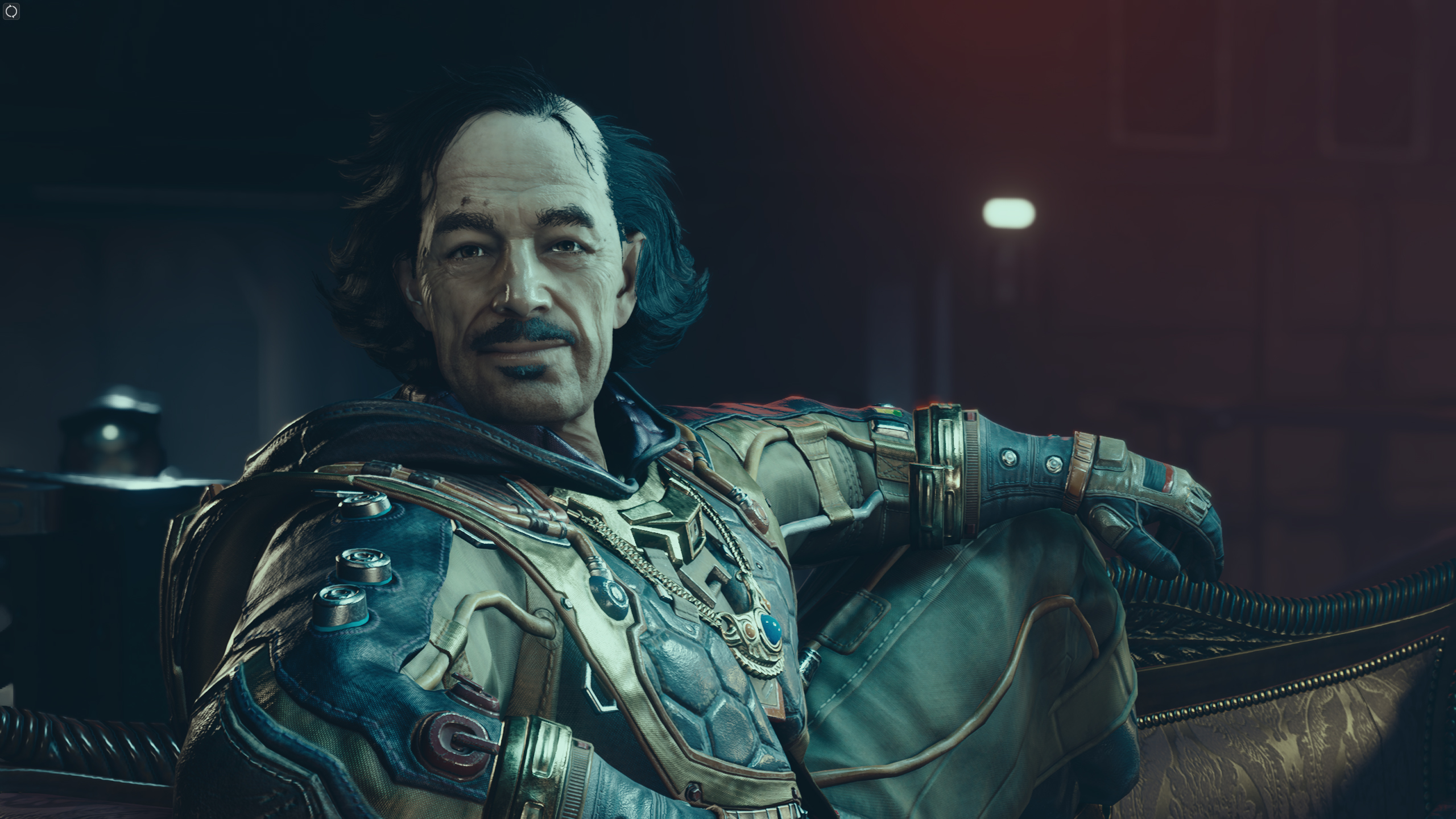
I've always found the real joy of Bethesda's RPGs to be not the main story or official quests but the sandbox itself, the freedom to come up with your own goals and aspirations. So after about 75 hours I retired my helpful artifact-collecting space ranger and created a second character with the goal of completely ignoring the main quest. Once free of the tutorial I headed straight to Neon, a densely populated and gritty cyberpunk city on an ocean planet, a place packed with gangs, addicts, shady operatives, and crooked security guards. The perfect place to start a life of crime.
Starfield is letting me write my own personal crime story, one that's already entertaining me more than most of the official questlines have.
I immediately wormed my way into the criminal underworld when I saw a drug smuggler being arrested: before long I'd met his boss and had his job, and began making illegal drug shipments myself. Between drug runs I became a low-level operative for mega-corporation Ryujin Industries, dabbling in corporate skullduggery and industrial espionage while still sidelining as petty drug mule.
And while skulking through a nightclub on a sanctioned operation, I happened to notice the city's crime boss (my boss's boss) standing with his back to me. I slithered up behind him, pickpocketed his penthouse key, then found his ritzy home, let myself in, and burglarized his safe and valuables. After visiting all the shopkeepers in Neon I eventually found a fence who buys stolen property and unloaded everything I'd stolen, making a nice pile of credits on top of the shady quest I was already getting paid for.
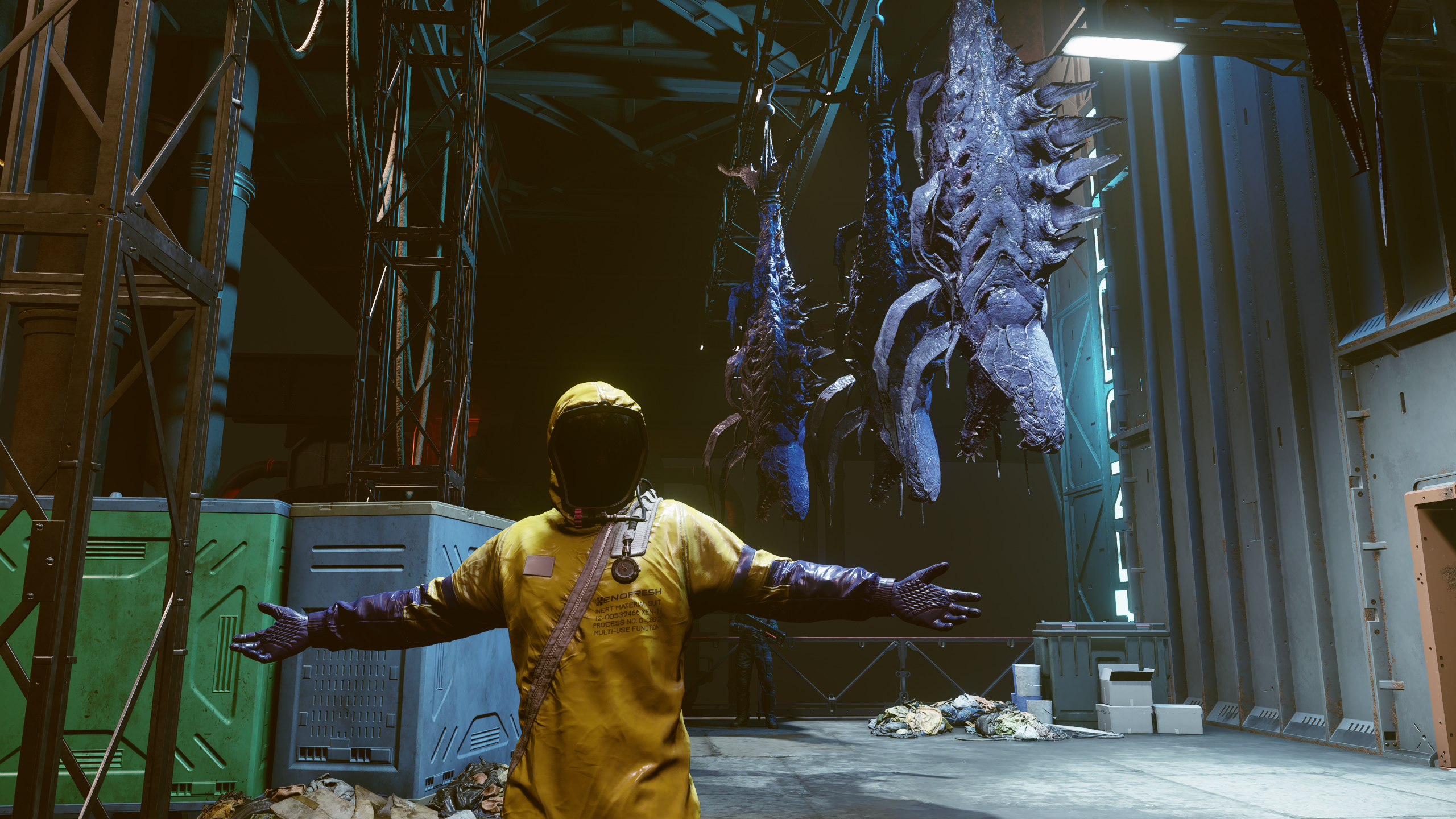
Encouraged by that success, I've begun my own freeform crime operation. As a part of my work as a mule I learned the formula to synthesize a popular drug, so I'm now in the midst of building an offworld drug manufacturing base, scouring the galaxy for moons and planets that will let me extract the particular chemicals I need. It's the first step in my personal mission to become the Walter White of space meth.
There's no quest marker for that, it's just something I want to do. I've even hired a bodyguard, a new companion I spotted in a Neon nightclub who has weapon skills to compliment my stealth and who won't gripe about the murders I commit the way Constellation members do. This is what Bethesda RPGs excel at, giving you a sandbox to imagine and complete your own person main quests, and even just a dozen hours in as my petty crook, Starfield is letting me write my own personal crime story, one that's already entertaining me more than most of the official questlines have.
Equipment malfunction
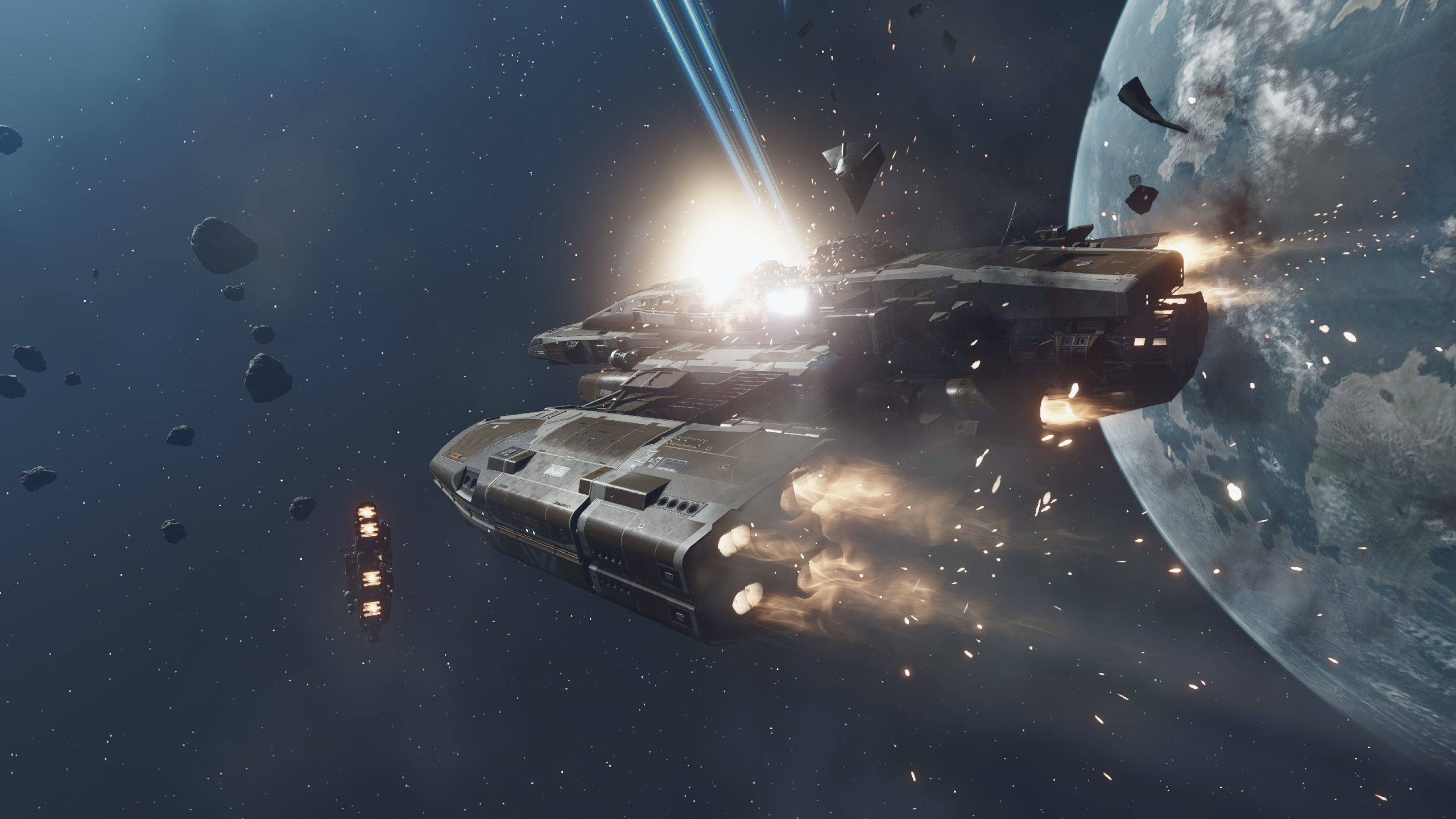
Part of me was hoping Starfield's long years of development and 10-month delay would lead to a more polished experience. Nah. There's as much Bethesda jank on display in Starfield as there ever was. Most of it is harmless and occasionally comical: speak to someone while they're mid-stride and they'll often continue shuffling along while they talk, taking one slow, faltering step at a time, until they've walked almost all the way down a corridor or around a corner during the conversation. I stood watching a guy in a restaurant slowly drift through the table and chair and eventually through the back wall. Every single city I visit has one member of the security team dressed only in their underwear. (Or maybe that's not a glitch and they just take Casual Friday very seriously in the future.)
Starfield is plenty janky and a bit buggy, but I also found it extremely stable.
In terms of genuine, irritating bugs that get in the way of the playing, I didn't have all that many (this isn't a Cyberpunk 2077 launch situation, in other words). One space pirate got wedged behind the scenery on a space station, meaning I had to enable cheats to clip through a wall and finish him off to satisfy the quest. On two different occasions I was midway through a persuasion minigame when the companions of the person I was attempting to charm simply opened fire, even on successive reloads. I also had a few quest marker goofs where they pointed to the wrong location or didn't appear at all, typically solved by a restart, and one side quest refuses to advance even though it's pretty clear there's another part to it. On the plus side, in 90 hours of play I only had a single crash to desktop and a few loading screens that went on much longer than they should have. Starfield is plenty janky and a bit buggy, but I also found it extremely stable.
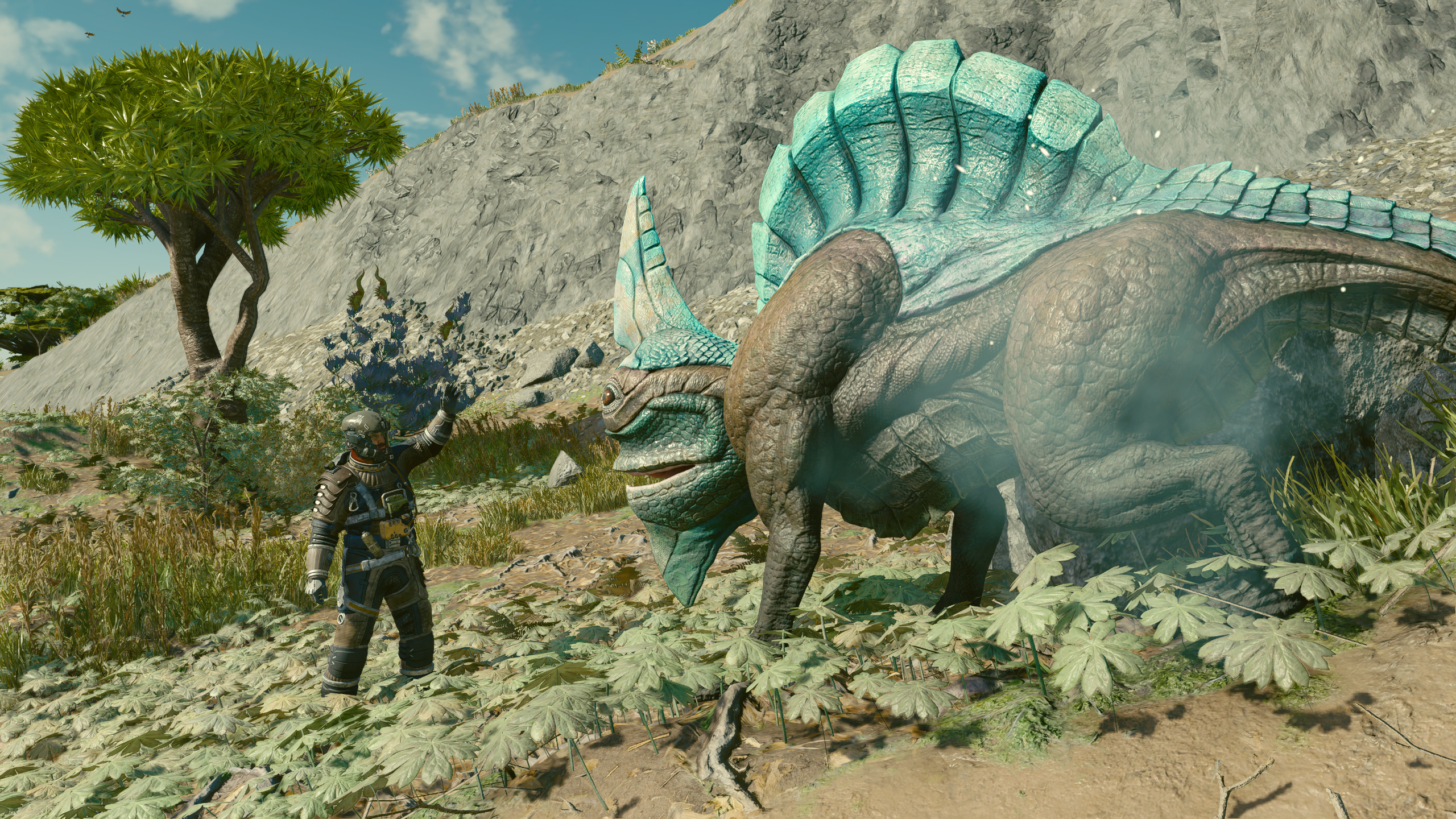
The systems you use almost constantly are also lacking: maps, minigames, and inventory. If you visit a planet and want to return later, there's no way to bookmark it on the star map (other than planting a base beacon on it, though you have a limited number of those) so I'd advise taking notes while you play. The inventory system is truly rotten, frustrating in a game where you're collecting anything and everything and trying to shuffle items between your companion, your ship's inventory, your storage crates at your base, and your own pockets.
I have some not-minor minigame gripes as well: lockpicking is simply a puzzle game now—in earlier Bethesda games it at least felt like using tools to play around inside a lock's mechanism. And while I'm glad there's a persuasion system, it's not a good one: you basically pick from a few options and hope the hidden dice rolls are in your favor. Bizarrely, there are no local city maps at all, and in a big city like New Atlantis or Neon, that makes finding what you're looking for, sometimes even when it's marked with a quest icon, pretty exasperating.
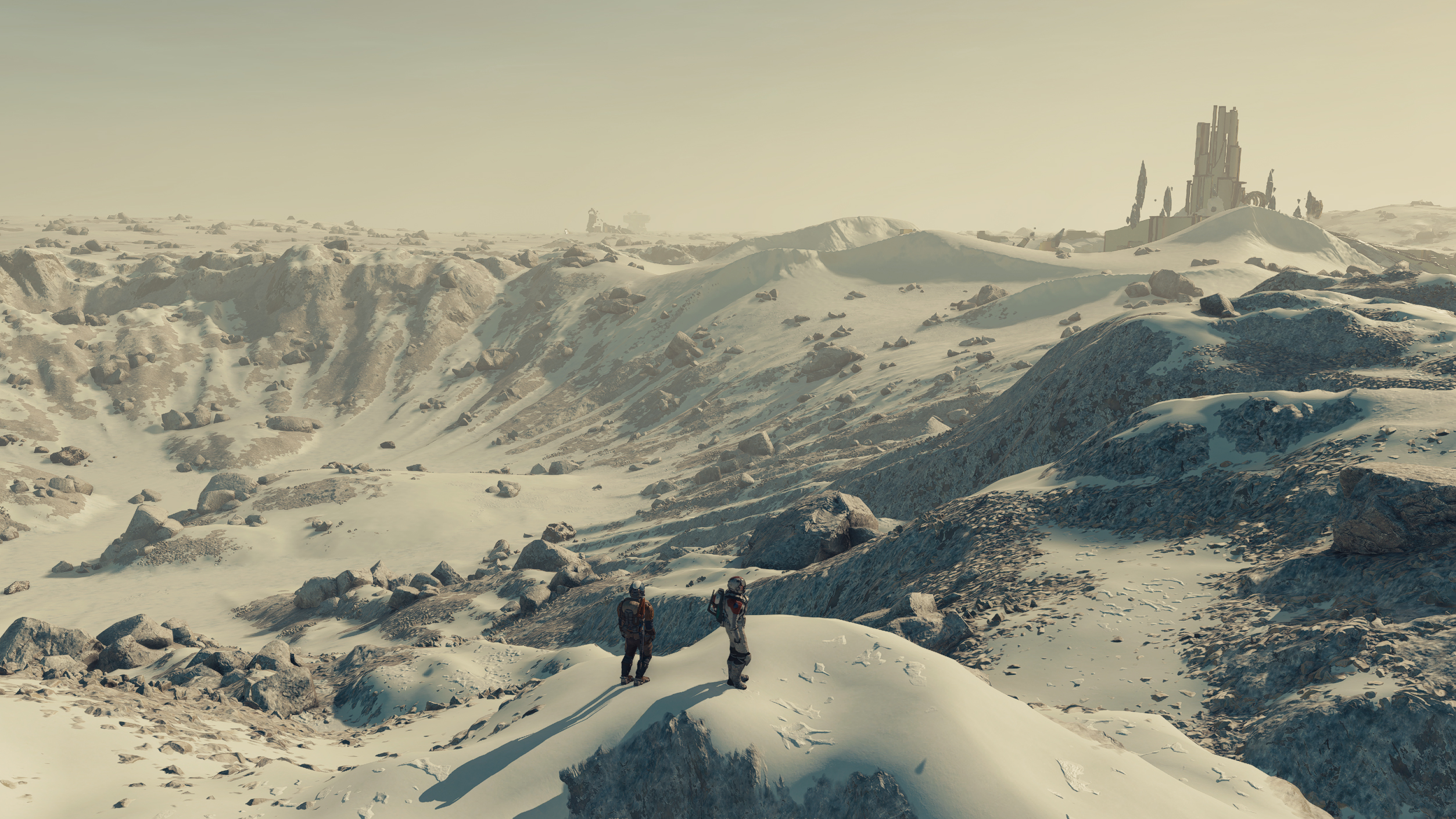
After all the hype and hope and anticipation, I'm disappointed to say I don't love Starfield the way I love other Bethesda RPGs. It's similar in a lot of ways, but Starfield never feels as instantly engrossing and transporting as Oblivion or Skyrim or as wild and weird as the Fallout games.
It comes close on occasion: one settlement on a far-flung planet is right up there with the most entertaining Vault-Tec experiments of all time. But more often the promising premises I found in remote bases or mysterious space stations tended to fizzle out. Starfield's alien bugs, even the truly monstrous ones, don't hold a candle to Skyrim's menagerie of beasts, faction quests never match the intrigue and brilliance of Oblivion's guild quests, and though Starfield's "spacers" and Fallout's raiders probably share the same basic code (attack player on sight) they just don't have as much personality.
So, I don't love Starfield, but I'm happy to say that I do like it. Those first 90 hours I played were far from perfect, but I've got plenty of reasons to play 90 more.
Starfield shares plenty of DNA with Skyrim and Fallout 4, but ultimately falls short of both.

Chris started playing PC games in the 1980s, started writing about them in the early 2000s, and (finally) started getting paid to write about them in the late 2000s. Following a few years as a regular freelancer, PC Gamer hired him in 2014, probably so he'd stop emailing them asking for more work. Chris has a love-hate relationship with survival games and an unhealthy fascination with the inner lives of NPCs. He's also a fan of offbeat simulation games, mods, and ignoring storylines in RPGs so he can make up his own.
